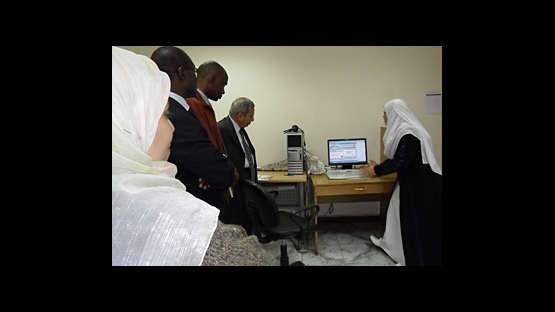The IAEA is joining forces with a number of African countries to help equip them with a new generation of health care professionals to deal with cancer, which is fast supplanting HIV/AIDS, tuberculosis (TB) and malaria as the developing world´s top killer.
Under the Millennium Development Goals, the United Nations has made progress both in retarding the spread of HIV/AIDS, TB and malaria and improving access to treatment. As a result, experts expect cancer deaths in low-income countries to surpass the other three, rising to 3.5 million in 2030 from two million in 2010, while the trio´s collective toll is seen dropping to 1.6 million in 2030 from three million in 2010.
"According to the latest World Health Organization (WHO) data, deaths from TB, malaria and HIV/AIDS are coming down as countries have invested resources into them," said Susan Morgan, an IAEA expert. "But cancer incidence is fast increasing in the developing world: people are living longer, diets are including more processed, unhealthy foods and smoking is becoming more prevalent."
Cancer sufferers in Africa face particular difficulties, for 17 IAEA Member States have no cancer radiation therapy centres and another 20, only one each. According to WHO, Africa also has fewer than five per cent of the world´s specialized health care workforce, insufficient to handle the incidence of this deadly disease.
Africa needs an additional 3 000 cancer care professionals over the next 10 years, experts say. But under existing infrastructure and educational systems, training such a number is all but impossible: training abroad is expensive and perforce small scale, on the ground there is limited training capacity, too few mentor practitioners and too many of the highly skilled leave the region once trained.
The IAEA realized that with such a huge need a different approach was required. The IAEA´s strength lies in delivering training, technical expertise and tailored support, in large part through its Technical Cooperation programme, to Member States using nuclear applications to diagnose and treat cancer.
To Create Lasting Solutions, IAEA Invests in People
One of the responses was the launching of the Virtual University for Cancer Control, another step in the IAEA´s long history of helping countries develop skills and infrastructure in radiation medicine, including through extensive curriculum development in radiation medicine by the Division of Human Health.
This pilot web-based training platform is designed to prepare the new workforce locally and affordably. It leverages off partnerships with WHO, African academic institutions and Africa Virtual University, which was set up by the World Bank and the United Nations Development Programme. It will also make use of tested teaching materials developed by the IAEA over the years. The University will help develop as well as be supported by a regional African training and mentorship network, and is collectively known as VUCCnet.
"Comprehensive care cannot become a reality if the workforce to carry it out doesn´t exist," said Ms. Morgan, who coordinates the IAEA´s VUCCnet project. "In Africa, not everyone can afford to travel or to stay in accommodation during training. An e-learning system will allow people, as much as possible, to undertake training locally."
The five-year VUCCnet project, launched in May 2010, involves mentor countries such as South Africa and Egypt, which already have significant comprehensive cancer care programmes, and pilot countries Ghana, Tanzania, Zambia and Uganda.
Work Now and Over Next 12 Months
The IAEA and a wide range of international and Africa partners are currently busy tackling some of the challenges of mounting the ambitious regional, high-tech project.
Teams are, for example, visiting the pilot countries to assess potential computer access points, most likely based around existing university and hospital centres. Another group is devising a virtual 10 - 15 hour course on cervical cancer, one of the most prevalent cancers in the region, which is expected to be ready for prototype testing by physicians in the field in April. This course will then be cascaded to others in the field.
The project reaches a milestone at its one-year meeting in May. Pilot countries will present their five top priorities in training professionals for tackling cancer. A global set of five priorities will be distilled from this work and adaptation of available curriculum will begin in each area, taking into account the support the pilot countries might receive from the mentor countries and their own existing cancer care strengths and training capacities. These strengths include radiation therapy, palliative care, radiation oncology or clinical oncology programmes.
"This is about proposing and testing a regional approach, working together, leveraging existing strengths and current training models," said Ms. Morgan. "This is about facilitating local capacity building both for students who otherwise couldn´t afford to study and for countries to sustainably train a workforce of cancer care professionals."


